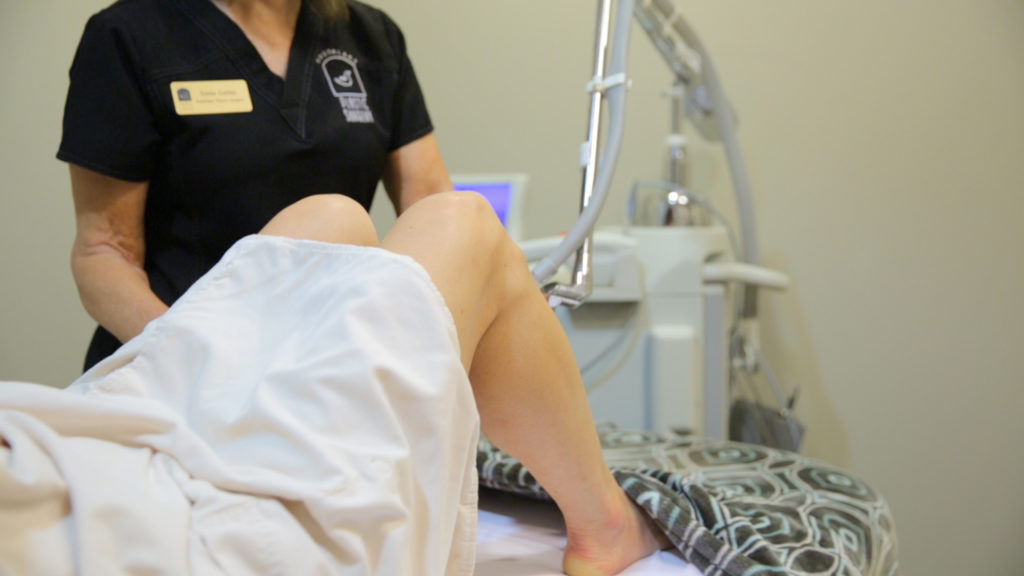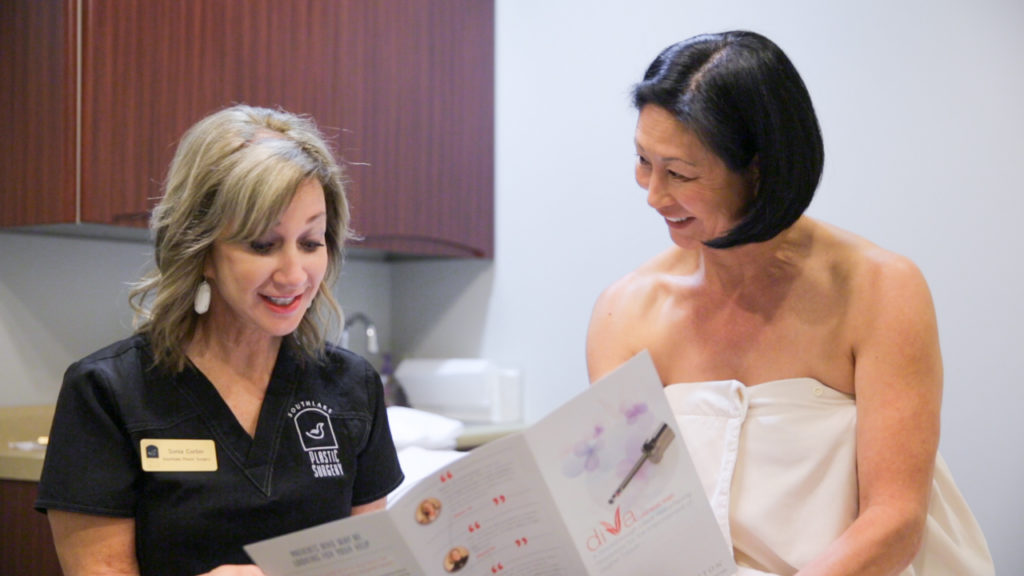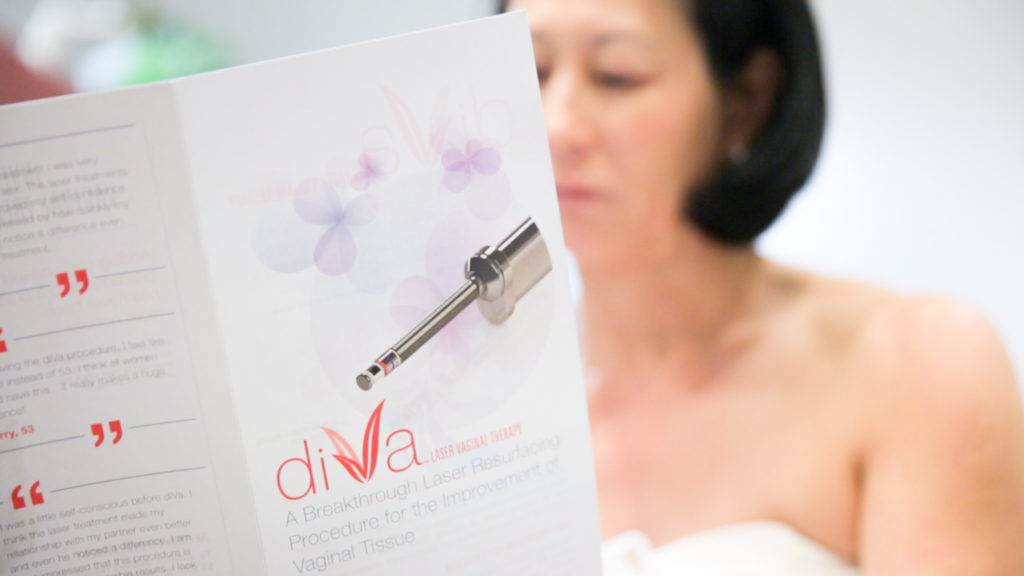Your Guide to Laser Vaginal Therapy in Southlake
As the years pass, your face isn’t the only part of your body that ages. While wrinkles, dark spots, and skin laxity may be more visible to the public eye, it doesn’t mean you should ignore the importance of vaginal health.
With laser vaginal therapy, you can revamp your vaginal tissue to help your body look and feel younger. At Southlake Plastic Surgery & Medspa, we’ve found that the diVa Laser quickly rejuvenates the vaginal area without surgery or excessive pain.
To help you on your vaginal rejuvenation journey, we’ve created an in-depth guide on diVa and how laser vaginal therapy can help you reach your goals.
How aging affects your vagina
Even though you may not want to talk about it, an aging vagina is nothing to be embarrassed about. In fact, all women will experience vaginal aging at some point in their lives. After puberty, there are three major stages of life that change how your vagina looks, feels, and stretches.
Stage One: Childbirth
Having your first child is a big deal for your body (you should be proud!). Your pelvic muscles stretch, and your vagina may even tear. You may even notice that your vagina is a bit looser and drier. A woman’s body has incredible healing capabilities; however, some changes can be permanent.
Stage Two: Perimenopause
Perimenopause is the 5-to-10-year period before menopause (usually starts around age 40). During this time, your body will start producing less estrogen. With less estrogen, the vagina won’t be as plump or moist as it was in your younger years. You may even start seeing some laxity and discoloration.
Stage Three: Menopause
Once you hit menopause, your vagina and clitoris may shrink. Vaginal walls will continue to get thinner and drier, though this does vary from person to person. For some women, vaginal atrophy can lead to painful sex.
The importance of collagen for vaginal rejuvenation
You probably know just how important collagen is for your skin, especially with all the supplements, creams, and aesthetic treatments on the market. Similarly to your face, collagen is incredibly important to maintain the youthfulness of your vagina.
Here’s why:
Collagen fibers strengthen vaginal tissue, which plays a major role in supporting the area. Over time, the amount of collagen your body produces decreases, causing the area to loosen and lose its elasticity. The balance of collagen comes from the amount of collagen synthesis (production) and collagen degradation. However, after menopause collagen degradation starts to overpower collagen synthesis.
Therefore, to boost collagen production, your body is going to need a little extra help, and that comes from the power of laser vaginal therapy.
How the diVa Laser works

Regardless of what stage of life you’re in, the diVa Laser can stimulate collagen production in your vaginal tissues to tighten, strengthen, and overall improve your vagina. diVa uses Hybrid Fractional Laser (HFL) technology to resurface the vaginal canal and target collagen deep within the tissue.
The wavelengths are what makes diVa stand above other vaginal laser resurfacing treatments. Unlike other lasers, diVa consists of two different wavelengths—ablative and non-ablative. The technology actually stemmed from the Halo Laser, the world’s first hybrid laser.
- Ablative wavelengths
Ablative wavelengths: Ablative wavelengths remove the surface layer, producing dramatic tissue-resurfacing results. This effect promotes collagen formation and skin tightening.
2. Non-ablative wavelengths
Non-ablative wavelengths: Non-ablative wavelengths are not nearly as aggressive, but are able to help with skin resurfacing and coagulation (thickening) of soft tissue. The wavelengths do this by drilling small thermal injuries into vaginal tissue to kickstart collagen production.
What does the diVa Laser treat?
Because of the innovative hybrid technology, diVa can treat a wide range of vaginal issues that stem from childbirth, menopause, hysterectomies, chemotherapy, and more. The best way to understand whether diVa can treat your unique concerns, always go in for a consultation with an experienced laser specialist.
Vaginal dryness
Vaginal secretions help lubricate the vaginal walls to reduce unwanted friction during sex. As you age, your vaginal walls may become thinner, which lowers the amount of lubrication produced. Vaginal dryness (atrophic vaginitis), can lead to discomfort or even pain during sex.
Although the main cause of vaginal dryness is hormonal changes, other factors can lead to the condition such as:
- Depression
- Extreme workouts
- Breastfeeding
- Smoking
- Stress
- Childbirth
- Immune system disorders
- Certain cancer treatments
Vaginal laxity
For some women, vaginal laxity or looseness can negatively impact sexual intercourse. The two main causes of laxity are childbirth and aging, though there are various other factors that could come into play.
Especially when you age, not only does collagen diminish, estrogen also decreases. Estrogen plays a role in the growing, maintaining, and repairing vaginal tissue. Without that hormone and enough collagen production, your vagina loses its elasticity and ability to bounce back.
Urinary incontinence
Losing control of your bladder can become a major cause of concern, but many women face this issue as they age. When muscles around the bladder weaken, the body has a hard time controlling bladder leaks. While urinary incontinence can happen to women of all ages, it’s more common for women who have entered menopause. In fact, 4 out of 10 women who are over 65 experience some type of urinary incontinence and lack of bladder control.
The Best Non-Invasive Urinary Incontinence Treatment for Women →
diVa Laser vaginal therapy frequently asked questions

What should I expect during a diVa therapy session?
You may be surprised just how quick the diVa process is. When you come in for your appointment, your provider will apply a topical anesthetic in the vaginal region to ensure you stay comfortable. After about 30 minutes, your laser vaginal treatment begins.
During the session, your provider will carefully position the diVa handpiece inside the vaginal canal. The automated handpiece then rotates through the treatment area, sending consistent laser energy into the surrounding tissue while your provider holds it in place. One of the great things about diVa is that the actual treatment only takes about 3 to 5 minutes, and then you’re free to go about the rest of your day!
Will a diVa treatment hurt?
No, a diVa treatment doesn’t typically hurt, mainly due to the topical numbing. During the procedure, you may feel some slight pressure and a knocking sensation, but it should not be uncomfortable. If you’re ever concerned about pain, you can always speak to your provider ahead of time to help you feel more at ease.
What should I do after a diVa treatment?
Once your diVa treatment is complete, you may notice some increased sensitivity in the treatment area. You may also notice spotting and vaginal discharge 1 to 3 days following the procedure. In addition, it’s very important that you don’t insert anything inside your vagina (including tampons) for 48 hours, but other than that, you can resume your normal activities. We highly recommend annual treatments to maintain your results.
How do I know if I’m a candidate for diVa?
The best way to know if you’re a candidate for diVa is through a consultation. During your consultation, you’ll be able to speak with a specialist about your conditions and what you hope to gain from laser vaginal therapy. From there, you’ll get a better understanding of whether or not diVa would be best for you. With that in mind, if you’re suffering from vaginal looseness, urinary incontinence, and even pain, diVa could be the right option for you!
Are there financing options for diVa?
Most facilities do offer financing options to help you afford your diVa treatment. At Southlake Plastic Surgery & Medspa, our number one priority is ensuring our patients can achieve their goals without breaking the bank. We are partnered with accredited financing providers that offer easy and convenient monthly payments. If you’re interested in financing options through Southlake, you can easily apply online.
Can I add diVa to my mommy makeover?
If you’re interested in a mommy makeover, then you can definitely add diVa to your treatment list! Since childbirth can affect the elasticity of your vagina and cause dryness, many women turn to laser therapy as an non-invasive treatment. Whenever you’re creating your procedure plan, always talk to your doctor to make sure he or she can integrate diVa into your makeover.
Schedule your diVa Laser vaginal therapy with Southlake Plastic Surgery today.
For the best diVa procedure in Southlake, Southlake Plastic Surgery is your place to go. We are an award-winning facility that always puts the needs of our patients first, ensuring that you get the aesthetics and body treatments you’ve been looking for.
Southlake Plastic Surgery also offers BioTE bioidentical hormone therapy which enhances any diVa treatments by helping to maintain estrogen levels. Be sure to ask about pairing hormone therapy with your diVa treatment to enhance your results.
During a free consultation, we’ll talk to you about your goals and what you hope to gain from your treatment. From there we can help you determine whether diVa will work best to give you the look you’re after.
Dr. Mason is one of the most experienced plastic surgeons in the area and is certified by the American Board of Plastic Surgery. So with us, you’ll always get the gold standard of treatments.


